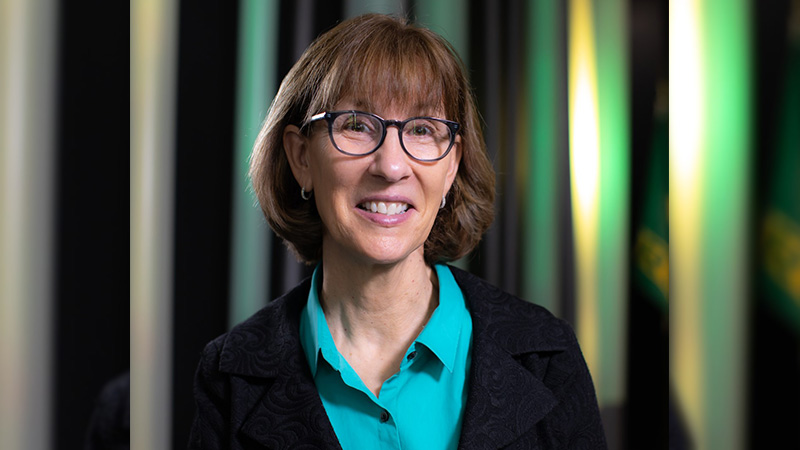
Ellen Schmidt-Devlin, BS ’81 (health education), MBA ’12 (general business) - cross country
Nike’s first female general manager, Bangkok, Thailand
Cofounder and executive director, UO Sports Product Management Portland Program
Producer, We Grew Wings documentary
Ellen Schmidt-Devlin remembers the first day she ran cross country for Oregon. A gentleman came up to her to shake her hand.
“He said, ‘Hi, my name is Bill Bowerman,’” she recalls from the 1976 encounter in the podcast Women Inspired World. “He said, ‘Would you get the girls of the team together to test Nike shoes?’ I shook his hand and said, ‘Nice to meet you Mr. Bowerman, but we’re not girls. We’re women.’ He thought that was very funny and we became fast friends.”
That encounter set Schmidt-Devlin on a path that changed her life. While at the UO, she worked in Bowerman’s Innovation Lab as a student. After college, she wrote a letter to Bowerman, asking him to be her reference, and his response was, “Come work for me. Bill.” And that started her on a 27-year career at Nike.
At Nike, Schmidt-Devlin managed and directed footwear design across Asia, Canada, and Central/South America. She was the first female to serve as a general manager leading Nike’s Bangkok, Thailand Liaison office in 2001. Schmidt-Devlin recalls that while there were eight similar positions around the globe, no other women were at that level. However, by 2009 when she left the Nike Liaison Office as general manager in Busan, Korea, and Qingdao, China, six of the eight positions were held by women.
“What I found in my career is that I would have to go first,” Schmidt-Devlin told Women Inspired World. “I would have to be brave enough, have enough courage to say, ‘Okay, this may not work out, but if it does work out, it will work out not just for me, but for many other women.’”
After retiring from Nike, she returned to the UO and received her master’s degree in general business in 2012. She then saw an opportunity to educate the public about the legacy of women’s track and field at the University of Oregon and to inspire the next generation of athletes through the documentary, We Grew Wings.
“Oftentimes we sit back and say, ‘Why aren’t the stories of women being told?’ I think we have to look at ourselves and realize it’s up to women to begin to tell the stories of women. And since I had run track, I decided that it was my obligation to tell the stories of women at the University of Oregon.”
Today, Schmidt-Devlin serves as the Lundquist College of Business’ cofounder and executive director of the Sports Product Management Program.